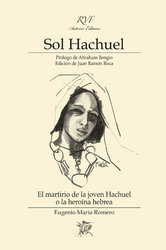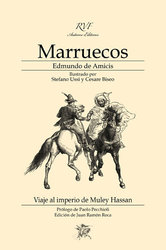Books and publications
Index / Activities / Books and publications / Morocco’s Empire as Seen by Nineteenth-Century Europe
Morocco’s Empire as Seen by Nineteenth-Century Europe
From February 10, 2014 until February 17, 2014
Presentation of the Siglo XXI CollectionFebruary 13, 2014 - MADRID
The purpose of this presentation is to take a closer look at the view which Europe had of Morocco’s empire throughout the nineteenth century, through three authors and their now re-published works. Romero’s book The Hebrew Heroine is, from a chronological perspective, one of the first texts in prose during of Spanish romanticism. Its interest lies both in the story which it tells, based on real events that took place in Tangier and Fez in 1834, and in the tale told from the liberal viewpoint of the author, with the backdrop of incipient colonialism occurring in North Africa. The Journey to Morocco, by Edmundo de Amicis, once again shows the interest of these colonial powers, in this case the recently unified Italian state, to establish diplomatic and commercial relations with Morocco, a country which was then poorly known despite its proximity to Europe. As for John Drummond Hay, for over 40 years he held the position of Consul General of Great Britain in Tangier, and unlike other European travel writers and adventurers, in his Morocco and Its Nomadic Tribes, we find a narrator who has perfect mastery of the local language, the Moroccan dialect, which allows him to travel deep into the country’s interior alongside Arabs and Berbers, taking advantage of the opportunity to get first-person experience of moments in everyday Moroccan life, as well as hearing the real and fantastic stories which he would later collect in his book.
 Little is known of Eugenio María Romero, besides his book The Hebrew Heroine, which he had published for the first time in Gibraltar in 1837, other than the fact that a serious accusation was made against him in 1835 for promoting plans to form a republic against the Monarchy, though he was not found guilty in the end. His ties to the liberal, anti-clerical and Romantic movements seem clear based on his exile in Gibraltar –a refuge for many Spanish liberals throughout the nineteenth century– along with the Duke of Rivas. The Duke’s literary influence is reflected by the clear ideology of the message which Romero conveys to us in his work.
Little is known of Eugenio María Romero, besides his book The Hebrew Heroine, which he had published for the first time in Gibraltar in 1837, other than the fact that a serious accusation was made against him in 1835 for promoting plans to form a republic against the Monarchy, though he was not found guilty in the end. His ties to the liberal, anti-clerical and Romantic movements seem clear based on his exile in Gibraltar –a refuge for many Spanish liberals throughout the nineteenth century– along with the Duke of Rivas. The Duke’s literary influence is reflected by the clear ideology of the message which Romero conveys to us in his work.
 Edmundo de Amicis (Oneglia, 1846 - Bordighera, 1908). An Italian writer and journalist, while he was a correspondent for the newspaper Nazione he had the opportunity to visit many countries. Those trips and his skill at describing the places and customs in the places he passed through led to the publication of a series of books in which he was able to recount his impressions: Spain (1873), Memories of London (1874), Holland (1874), Morocco (1876), Constantinople (1878) and Memories of Paris (1879) enjoyed great popularity and were very well-received in the late nineteenth century. In 1886, his best-known work, Cuore (Heart), was published and translated into more than forty languages and eventually brought to cinema and television, becoming known by millions thanks to the animated Japanese series Marco, from the Apennines to the Andes, inspired by the narrative of the same name included in this book.
Edmundo de Amicis (Oneglia, 1846 - Bordighera, 1908). An Italian writer and journalist, while he was a correspondent for the newspaper Nazione he had the opportunity to visit many countries. Those trips and his skill at describing the places and customs in the places he passed through led to the publication of a series of books in which he was able to recount his impressions: Spain (1873), Memories of London (1874), Holland (1874), Morocco (1876), Constantinople (1878) and Memories of Paris (1879) enjoyed great popularity and were very well-received in the late nineteenth century. In 1886, his best-known work, Cuore (Heart), was published and translated into more than forty languages and eventually brought to cinema and television, becoming known by millions thanks to the animated Japanese series Marco, from the Apennines to the Andes, inspired by the narrative of the same name included in this book.
 John Drummond Hay (Valenciennes, France, 1816 – Duns, Scotland, 1893). At the age of 24, Hay was named an attaché at the British Embassy in Constantinople. He remained there for four years until, in 1844, he was named assistant to his father Edward, then the Consul General of Great Britain in Tangier, advising him on his relations with the Sultan. After his father’s death in 1845, he would take over the same position, during which time he carried out notable diplomatic activity.
John Drummond Hay (Valenciennes, France, 1816 – Duns, Scotland, 1893). At the age of 24, Hay was named an attaché at the British Embassy in Constantinople. He remained there for four years until, in 1844, he was named assistant to his father Edward, then the Consul General of Great Britain in Tangier, advising him on his relations with the Sultan. After his father’s death in 1845, he would take over the same position, during which time he carried out notable diplomatic activity.


Casa Árabe and the publishing firm RVF are organizing the presentation of the Siglo XXI Collection by the RVF publishing firm with the participation of Bernabé López García, founding member of the International Studies Workshop at the Universidad Autónoma de Madrid, and Juan Ramón Roca, editor and director of the collection. Presenting the event is Nuria Medina, coordinator of Casa Árabe’s Culture and New Media area.
This event is taking place on Thursday, February 13 at 7:00 p.m. at the auditorium in Madrid.
Free entry until the event’s capacity is reached.
About the three authors
Eugenio María Romero
 Little is known of Eugenio María Romero, besides his book The Hebrew Heroine, which he had published for the first time in Gibraltar in 1837, other than the fact that a serious accusation was made against him in 1835 for promoting plans to form a republic against the Monarchy, though he was not found guilty in the end. His ties to the liberal, anti-clerical and Romantic movements seem clear based on his exile in Gibraltar –a refuge for many Spanish liberals throughout the nineteenth century– along with the Duke of Rivas. The Duke’s literary influence is reflected by the clear ideology of the message which Romero conveys to us in his work.
Little is known of Eugenio María Romero, besides his book The Hebrew Heroine, which he had published for the first time in Gibraltar in 1837, other than the fact that a serious accusation was made against him in 1835 for promoting plans to form a republic against the Monarchy, though he was not found guilty in the end. His ties to the liberal, anti-clerical and Romantic movements seem clear based on his exile in Gibraltar –a refuge for many Spanish liberals throughout the nineteenth century– along with the Duke of Rivas. The Duke’s literary influence is reflected by the clear ideology of the message which Romero conveys to us in his work.Edmundo de Amicis
 Edmundo de Amicis (Oneglia, 1846 - Bordighera, 1908). An Italian writer and journalist, while he was a correspondent for the newspaper Nazione he had the opportunity to visit many countries. Those trips and his skill at describing the places and customs in the places he passed through led to the publication of a series of books in which he was able to recount his impressions: Spain (1873), Memories of London (1874), Holland (1874), Morocco (1876), Constantinople (1878) and Memories of Paris (1879) enjoyed great popularity and were very well-received in the late nineteenth century. In 1886, his best-known work, Cuore (Heart), was published and translated into more than forty languages and eventually brought to cinema and television, becoming known by millions thanks to the animated Japanese series Marco, from the Apennines to the Andes, inspired by the narrative of the same name included in this book.
Edmundo de Amicis (Oneglia, 1846 - Bordighera, 1908). An Italian writer and journalist, while he was a correspondent for the newspaper Nazione he had the opportunity to visit many countries. Those trips and his skill at describing the places and customs in the places he passed through led to the publication of a series of books in which he was able to recount his impressions: Spain (1873), Memories of London (1874), Holland (1874), Morocco (1876), Constantinople (1878) and Memories of Paris (1879) enjoyed great popularity and were very well-received in the late nineteenth century. In 1886, his best-known work, Cuore (Heart), was published and translated into more than forty languages and eventually brought to cinema and television, becoming known by millions thanks to the animated Japanese series Marco, from the Apennines to the Andes, inspired by the narrative of the same name included in this book.John Drummond Hay
 John Drummond Hay (Valenciennes, France, 1816 – Duns, Scotland, 1893). At the age of 24, Hay was named an attaché at the British Embassy in Constantinople. He remained there for four years until, in 1844, he was named assistant to his father Edward, then the Consul General of Great Britain in Tangier, advising him on his relations with the Sultan. After his father’s death in 1845, he would take over the same position, during which time he carried out notable diplomatic activity.
John Drummond Hay (Valenciennes, France, 1816 – Duns, Scotland, 1893). At the age of 24, Hay was named an attaché at the British Embassy in Constantinople. He remained there for four years until, in 1844, he was named assistant to his father Edward, then the Consul General of Great Britain in Tangier, advising him on his relations with the Sultan. After his father’s death in 1845, he would take over the same position, during which time he carried out notable diplomatic activity.Organized by:



